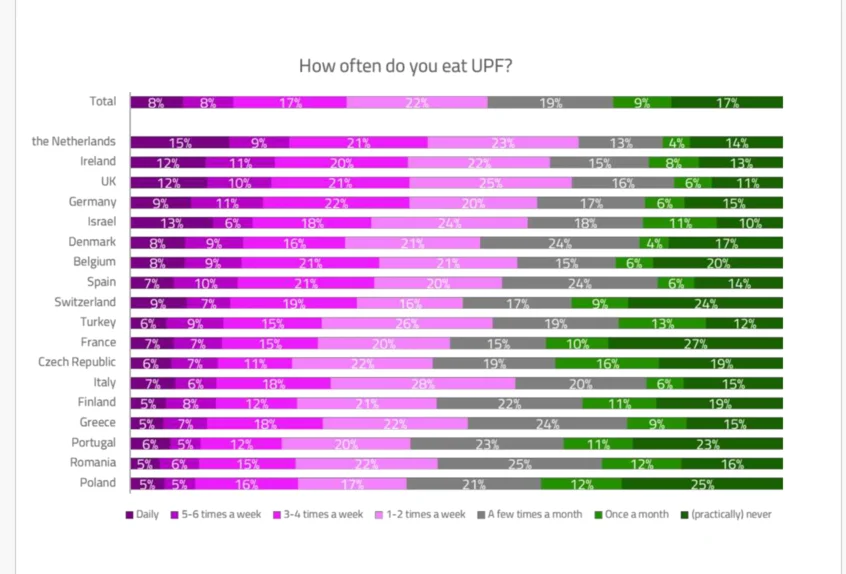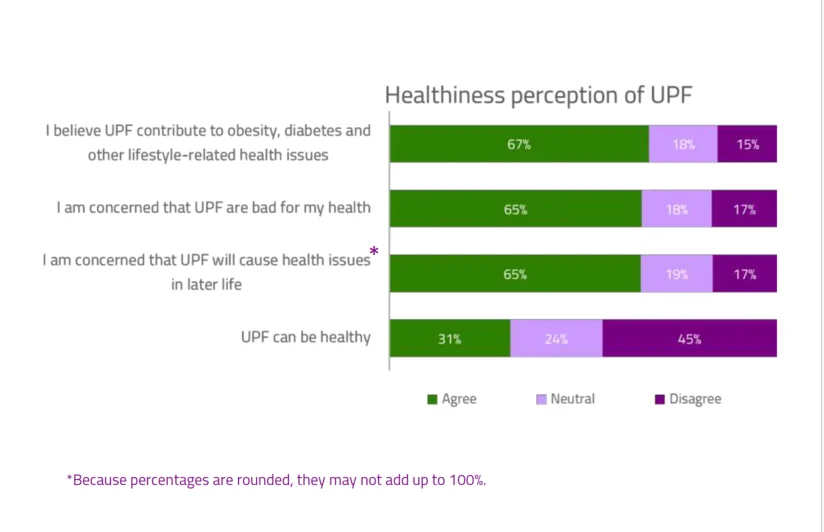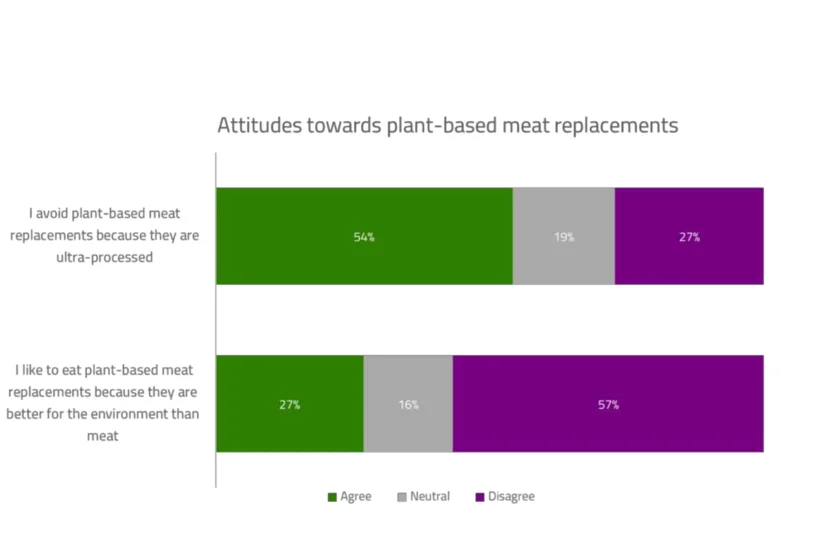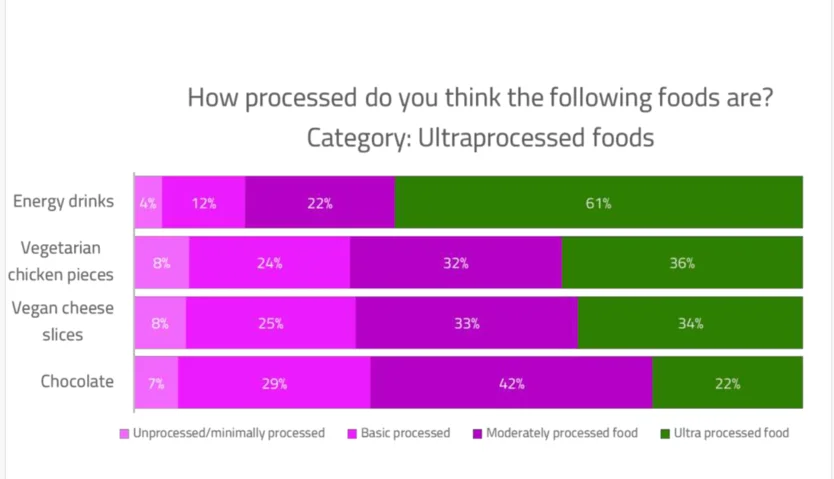A recent survey spanning 17 countries in Europe sheds light on the growing concern regarding the health implications of ultra-processed foods (UPFs) and the hesitancy towards plant-based meat alternatives. Conducted by the EIT Food Consumer Observatory, the poll, involving 9,787 participants, uncovers significant sentiments regarding dietary choices and health perceptions among Europeans.
According to the findings, a substantial 65% of respondents express worries about the health effects associated with UPFs, with an additional 60% expressing concerns about their environmental impact. Remarkably, over half of the surveyed individuals, specifically 54%, admit to avoiding plant-based meats due to their classification as ultra-processed.
Europeans associate UPFs with health issues but still consume them.

Courtesy: EIT Food Consumer Observatory
The study exposes a notable lack of understanding regarding what qualifies as UPFs, alongside misconceptions concerning their impact on health. Despite this, UPFs constitute a significant portion of European diets, representing 57% of the average person’s food intake in the UK and even higher percentages among certain
demographics such as children and individuals with lower incomes. Moreover, the survey reveals that 55% of Europeans consume UPFs at least once a week.
Originating from the NOVA classification, established in 2009 by Brazilian researchers led by Dr. C. Monteiro, UPFs are characterized by their industrial processing methods and incorporation of cosmetic additives and substances of limited culinary value.
Experts warn of the adverse health effects linked to UPFs, including an increased risk of various diseases such as heart disease, obesity, and diabetes.
Despite these concerns, a significant proportion of Europeans, approximately 31%, believe that certain UPFs can be healthy, aligning with a study published in The Lancet.
However, skepticism remains prevalent, with 40% of consumers expressing doubts about the adequacy of regulatory measures to ensure the safety and healthiness of UPFs in the long run.

Courtesy: EIT Food Consumer Observatory
The Connection Between UPFs (Ultra-Processed Foods) and Plant-Based Meat
There is a lack of awareness when it comes to the world of UPFs, particularly with their links to healthiness, as well as what foods are actually ultra-processed. The survey found that 54% of Europeans avoid meat alternatives due to their status as UPFs, particularly those who don’t follow meatless diets.

Courtesy: EIT Food Consumer Observatory
The survey also illuminates a lack of awareness regarding UPFs, particularly in relation to plant-based meat alternatives. While 61% of respondents correctly identify energy drinks as ultra-processed, only 34% do so for vegan cheese and 36% for vegan chicken.

Courtesy: EIT Food Consumer Observatory
The gap in education is highlighted by the fact that 61% of consumers correctly identified energy drinks as ultra-processed, but only 34% did so for vegan cheese and 36% for vegan chicken. A hyperawareness of UPFs towards the end of the survey project may have influenced consumers less familiar with traditional plant proteins like tempeh and tofu to label those as UPFs too.
Surprisingly, many Europeans do not find the climate impact of meat and plant-based alternatives convincing. Only 27% believe vegan options are better for the environment, while 57% think they have a worse impact. However, research indicates that animal-derived foods like meat and dairy produce twice as many emissions as plant-based foods, and vegan diets can reduce emissions, water pollution, and land use by 75% compared to meat-heavy diets.

Courtesy: EIT Food Consumer Observatory
This trend is worrisome for several reasons. Europeans generally have a better understanding of climate issues compared to their counterparts in the US, Asia, and beyond. Moreover, plant-based meat consumption and flexitarianism have gained popularity in Western European countries. The study’s findings challenge the environmental claims that plant-based meat companies have promoted over the years.
Critics argue against oversimplifying the concept of Ultra-Processed Foods (UPFs), claiming they are essential for global food security and highlighting the confusion surrounding their definition. The NOVA system, which categorizes foods based on processing level, fails to address their nutritional value.
Some campaigns inaccurately associate plant-based meats with terms like ‘ultra-processed’, leading to misconceptions about their healthiness. This misrepresentation taps into the fears some people have towards novel foods, often termed ‘food
neophobia’. Some campaigns even go further by using negative terms like ‘fake’ and ‘unnatural’ to describe plant-based meats, despite them being safe and nutritious alternatives
Recommendations for Food Companies and Health Authorities Regarding Ultra- Processed Foods (UPFs).
The report provides crucial recommendations for health authorities, manufacturers, and retailers concerning Ultra-Processed Foods (UPFs).Health institutions and researchers are urged to define UPFs clearly and offer well-founded insights into their short- and long-term health impacts.Health authorities should focus on educating consumers on food processing, its implications, and how to distinguish between whole foods and UPFs.
The study’s outcomes pose challenges for both food companies and health authorities, urging a reevaluation of current labelling practices and educational initiatives.
· National dietary guidelines should differentiate between whole foods and UPFs, addressing the classification of plant-based substitutes and their impact on healthiness.
· Moreover, policies could include restrictions on UPFs promotions, such as the UK’s proposal to prohibit two-for-one deals on unhealthy foods.
· Recommendations include clearer labelling to distinguish between whole foods and UPFs, as well as efforts to educate consumers about food processing and its health implications.
· Moreover, policies aimed at restricting the promotion of UPFs and incentivizing minimally processed alternatives are advocated.
· Plant-based meat producers should explore cleaner labels without additives or transformed ingredients to disassociate from UPFs.
· Retailers can highlight non-ultra-processed packaged foods like tempeh or tofu and refrain from promoting UPFs in discount offers.
· Consumer education, clearer labelling, and guidance are essential to enhance understanding of food production processes and promote healthier dietary choices.
· The focus should be on creating an informed consumer base and fostering dialogue to encourage positive dietary decisions for a healthier and more sustainable food system.
In conclusion, the survey underscores the need for enhanced consumer awareness and informed decision-making regarding dietary choices. By fostering dialogue and promoting healthier and more sustainable food options, stakeholders can collectively contribute to a positive shift towards a healthier food system for all.
For more information or to download the report

